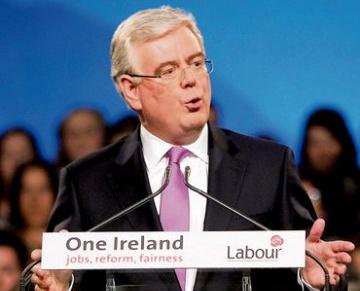Macho posturing about rescue package renegotiation merely an election stunt

On Thursday morning last Eamon Gilmore said at the Labour Party election headquarters in Golden Lane, Dublin, that he was seeking a mandate in the general election to renegotiate the €67 billion rescue package with the European Union and International Monetary Fund. He said the challenge facing the electorate was to accept the rescue deal or to trust Labour to change its terms. "It's Frankfurt's way or Labour's way." He said the choice facing the electorate was to have the budget decided in Frankfurt or by the Irish government.
At a press conference at the European Central Bank (ECB) headquarters in Frankfurt also on Thursday morning, the president of the ECB, Jean-Claude Trichet, was asked: "As you know, an election has been called in Ireland. Some of the opposition parties have been saying that they believe they would be able to renegotiate the terms of Ireland's rescue package. In your opinion, is that realistic? And is it reasonable for voters to expect that those parties would be able to do that?
Jean-Claude Trichet replied: "I usually do not comment on the functioning of our democracies. We have 27 exemplary democracies in Europe and 17 exemplary democracies in the euro area. Let me only say that Ireland has a medium-term plan approved by the international community, namely the IMF, and by the European Union, with the positive judgement of the Commission in liaison with the ECB. The implementation of the plan is absolutely essential, in the opinion of the ECB, for the credibility of the country".
There was a follow-up question: "How would you view it if parties coming into government in Ireland said that they were going to breach the terms of the deal"?
He replied: "No comment on that".
On Friday Eamon Gilmore was asked to respond to the clear message from Jean-Claude Trichet. He said the president of the ECB was a civil servant and had to adhere to the political decisions taken by the Council of Ministers. Once the Council of Ministers decided to revise the terms of the EU/IMF deal, then Jean-Claude Trichet would have to comply with the Council's decision.
Eamon Gilmore was one of the fans of the EU who strongly urged the Irish electorate to approve the recent series of EU Treaties. One would have assumed he was conversant with what the Treaties say about the European Central Bank. Article 282.3 of the consolidated version of the Treaties states: "The European Central Bank shall have legal personality. It alone may authorise the issue of the euro. It shall be independent in the exercise of its powers and in the management of its finances. Union institutions, bodies, offices and agencies and the governments of the Member States shall respect that independence".
In other words, Eamon Gilmore is entirely wrong about the subservience of the European Central Bank to the Council of Ministers or any other body or government. It is an independent agency. Jean-Claude Trichet may be a civil servant, but he is a civil servant responsible to nobody but the board of the ECB which acts entirely independently of governments or of any other EU institution.
The macho stuff about "It's Frankfurt's way or Labour's way", as though Eamon Gilmore was capable or might be capable of overturning the decision of the ECB on the deal with Ireland or on anything else is a stunt, a stunt to pretend to the electorate that if Labour gets a mandate to overturn the EU/IMF deal he can achieve that.
If it comes down to the deal being done in Frankfurt's way or Labour's way, without question it is Frankfurt's way. The pretence that it is otherwise is a con job and the same goes with Fine Gael's strutting on the same issue. It is probable there will be an easing of the interest rates on the EU part of the loans but that, if it happens, will have nothing at all to do with Eamon Gilmore or Michael Noonan or even Enda Kenny, it will be because of a EU wide agreement to that effect, prompted by considerations aside from anything to do with Ireland.
It is now clear the EU/IMF deal was initiated by the ECB, alarmed at the scale of financial support the Irish banks needed to survive – the ECB has lent the Irish banks over €100 billion at an interest rate of 1 per cent. And it is obvious from the letter dispatched by Jean-Claude Trichet to Brian Lenihan before Christmas, complaining about deviations from the detail of the agreement in the Credit Stabilisation Act that it is the ECB that is driving the whole project.
The only prospect of getting the ECB to relent would be to threaten to pull the plug on the banks here, if the debts of the Irish banks were not assumed by the ECB itself. That would only work if the ECB believed Ireland was mad enough to risk the consequences of a unilateral default. And, come to think of it, the ECB might think some of the ministers of the new government would be mad enough.
